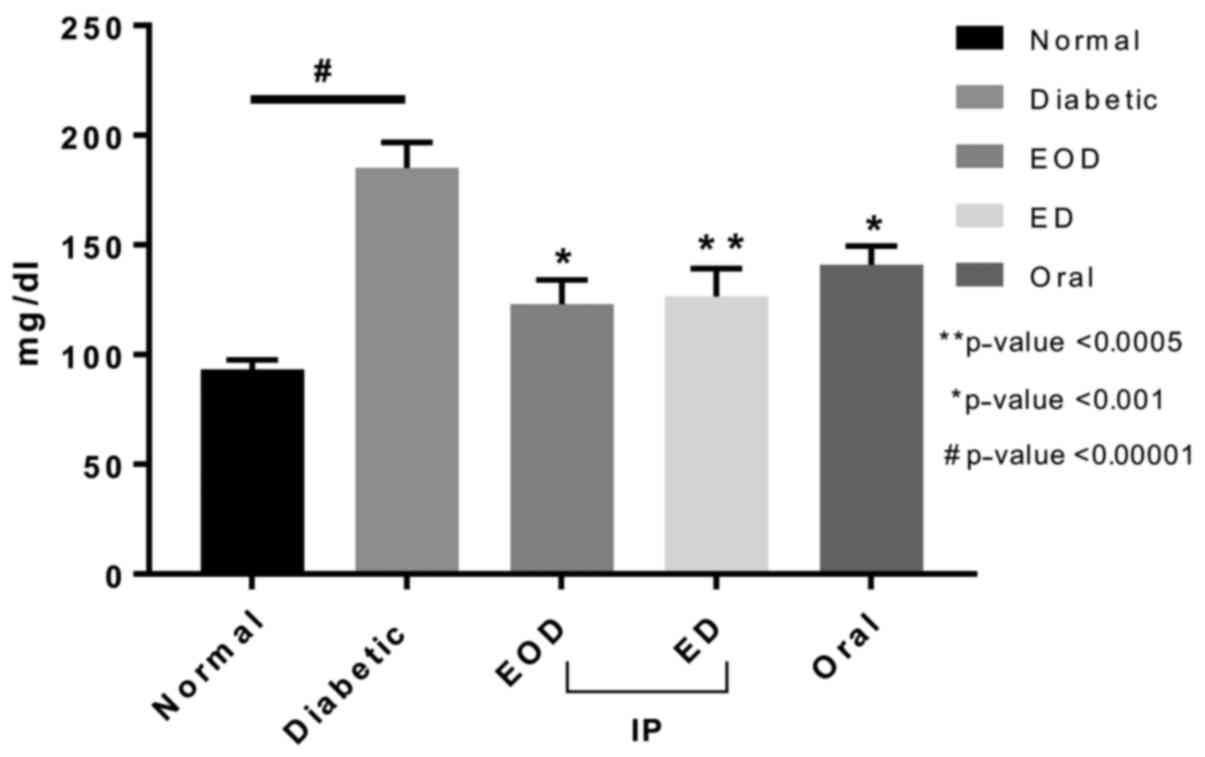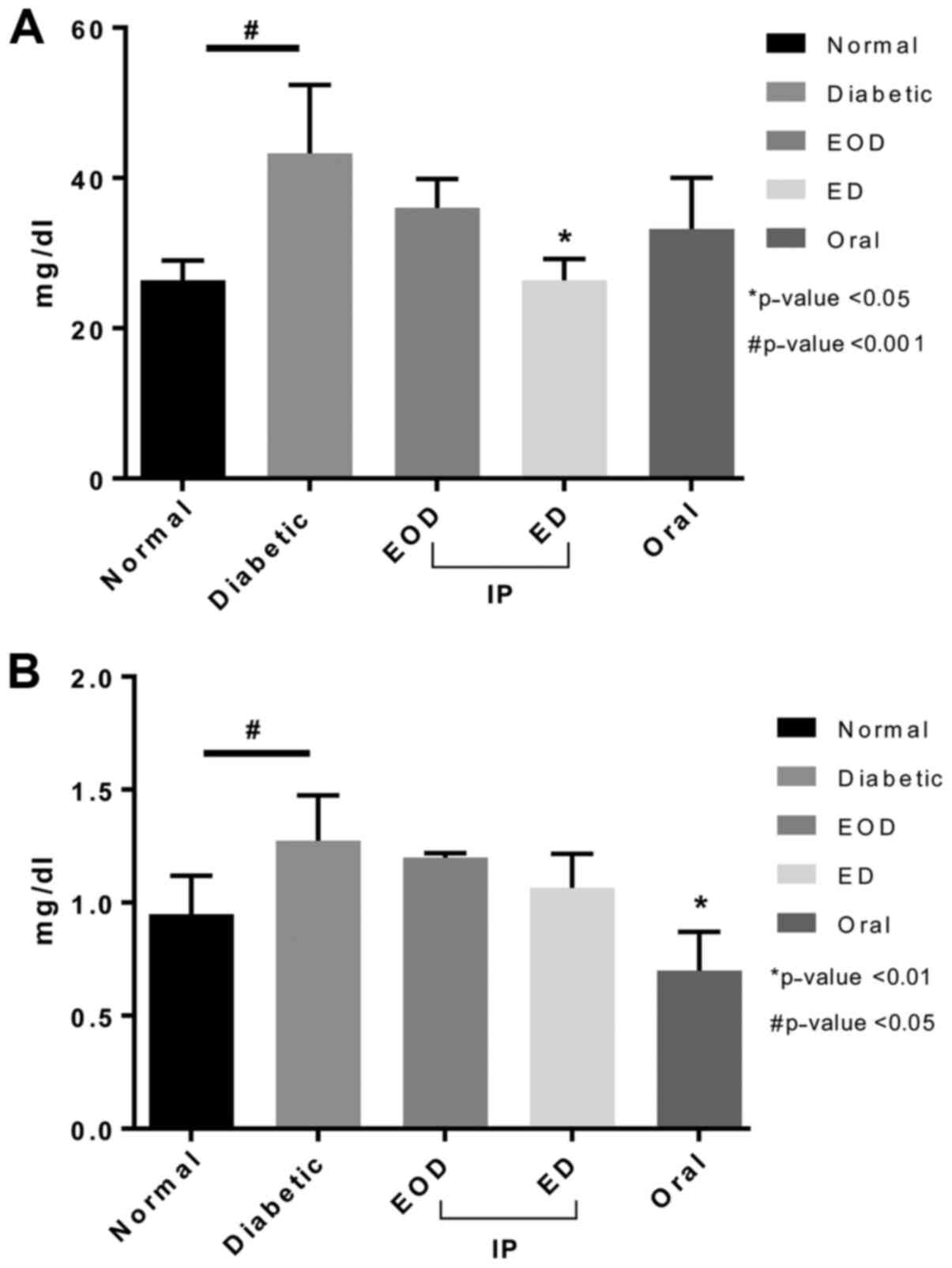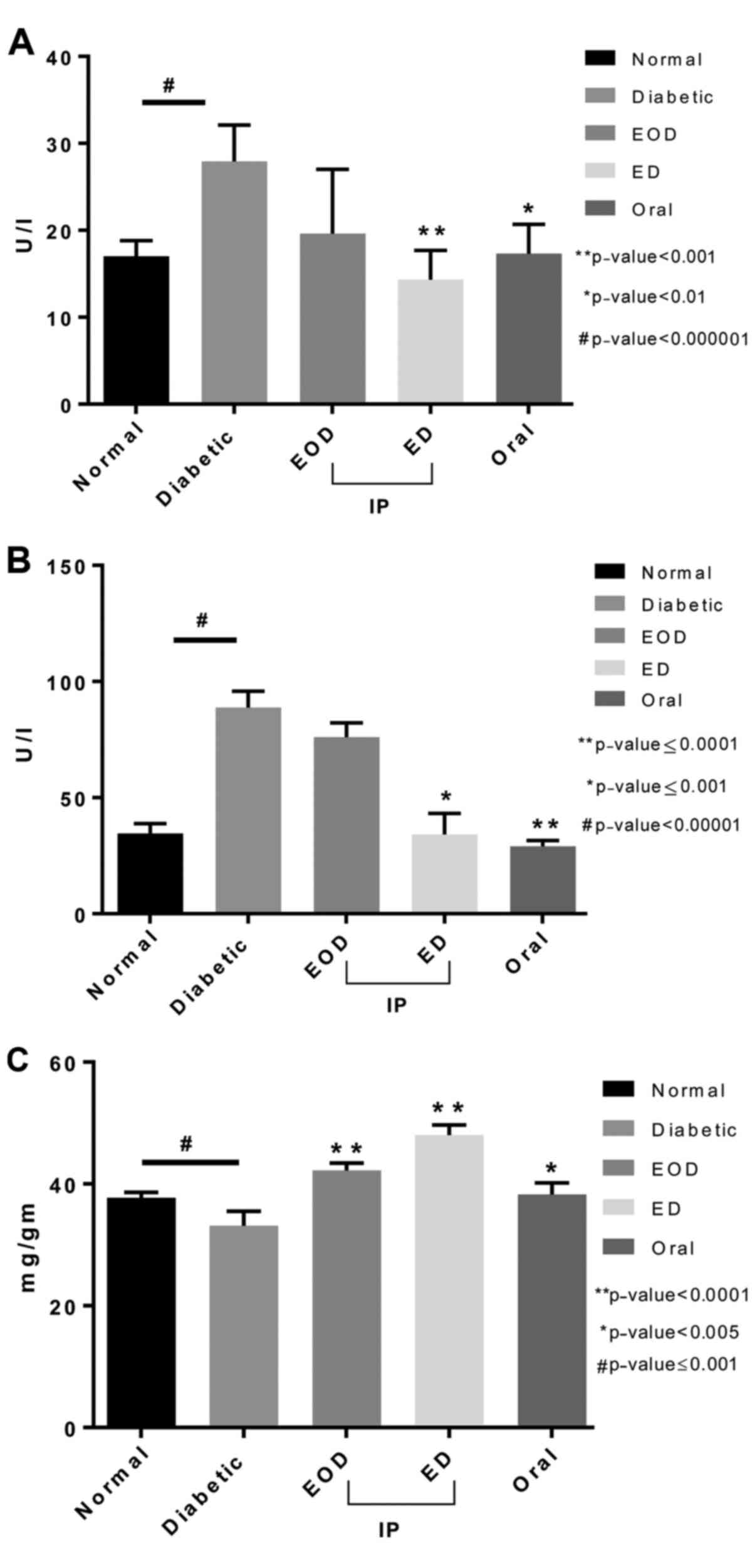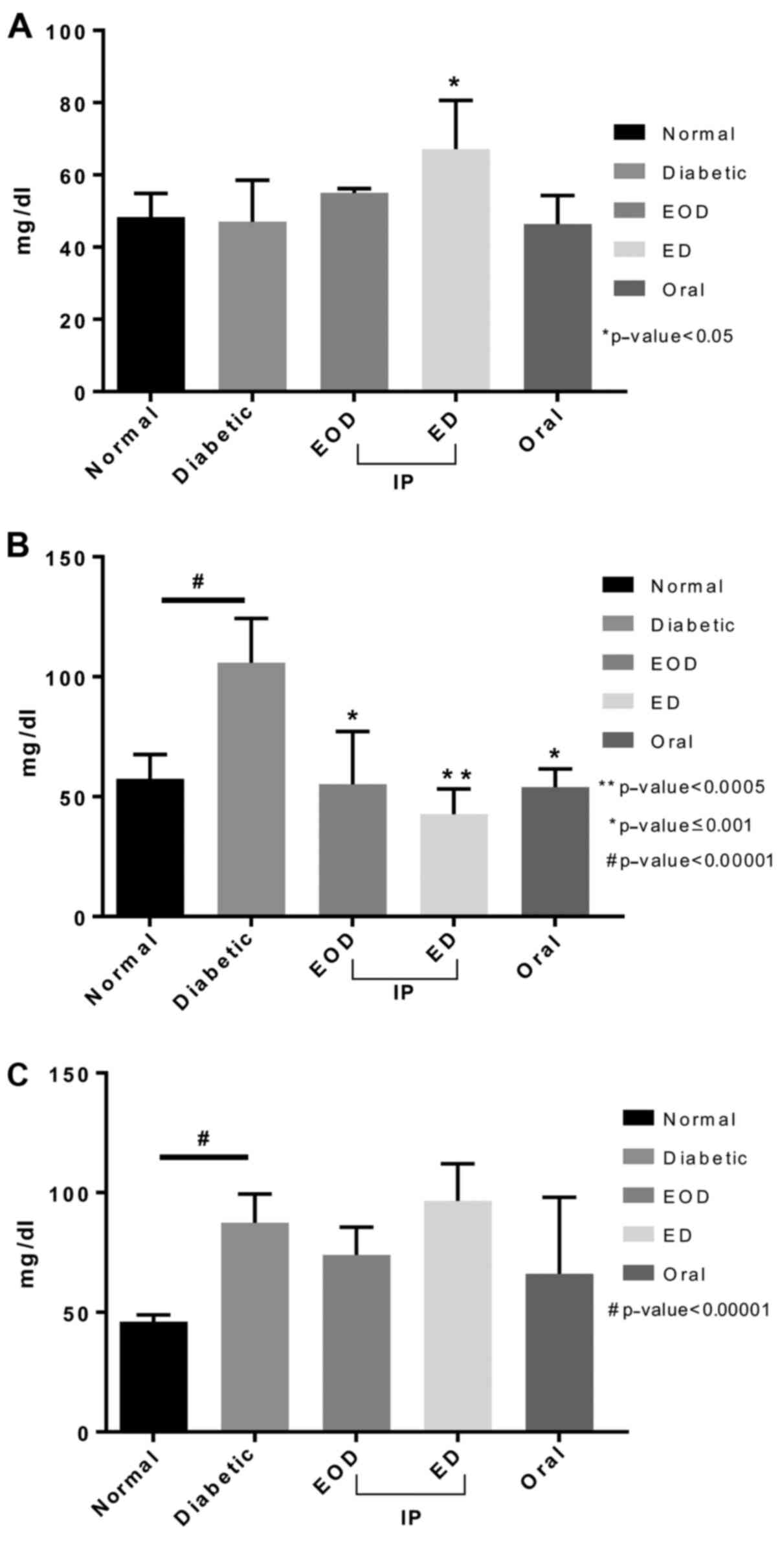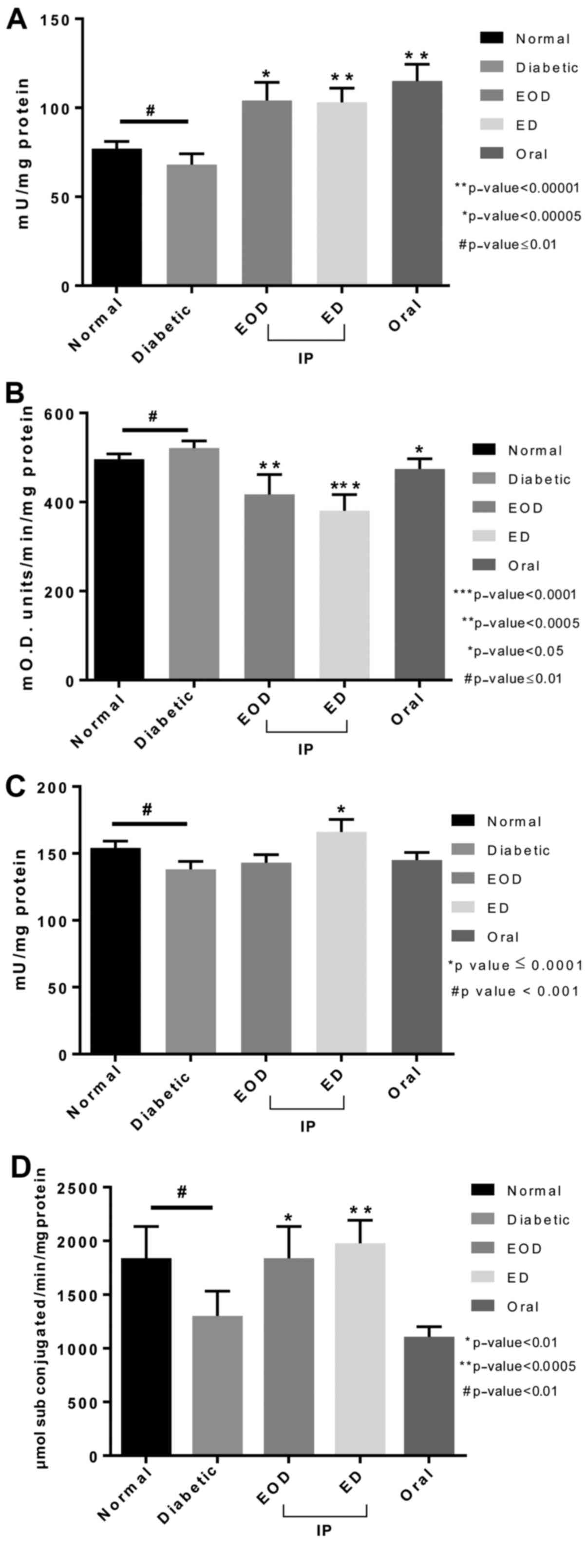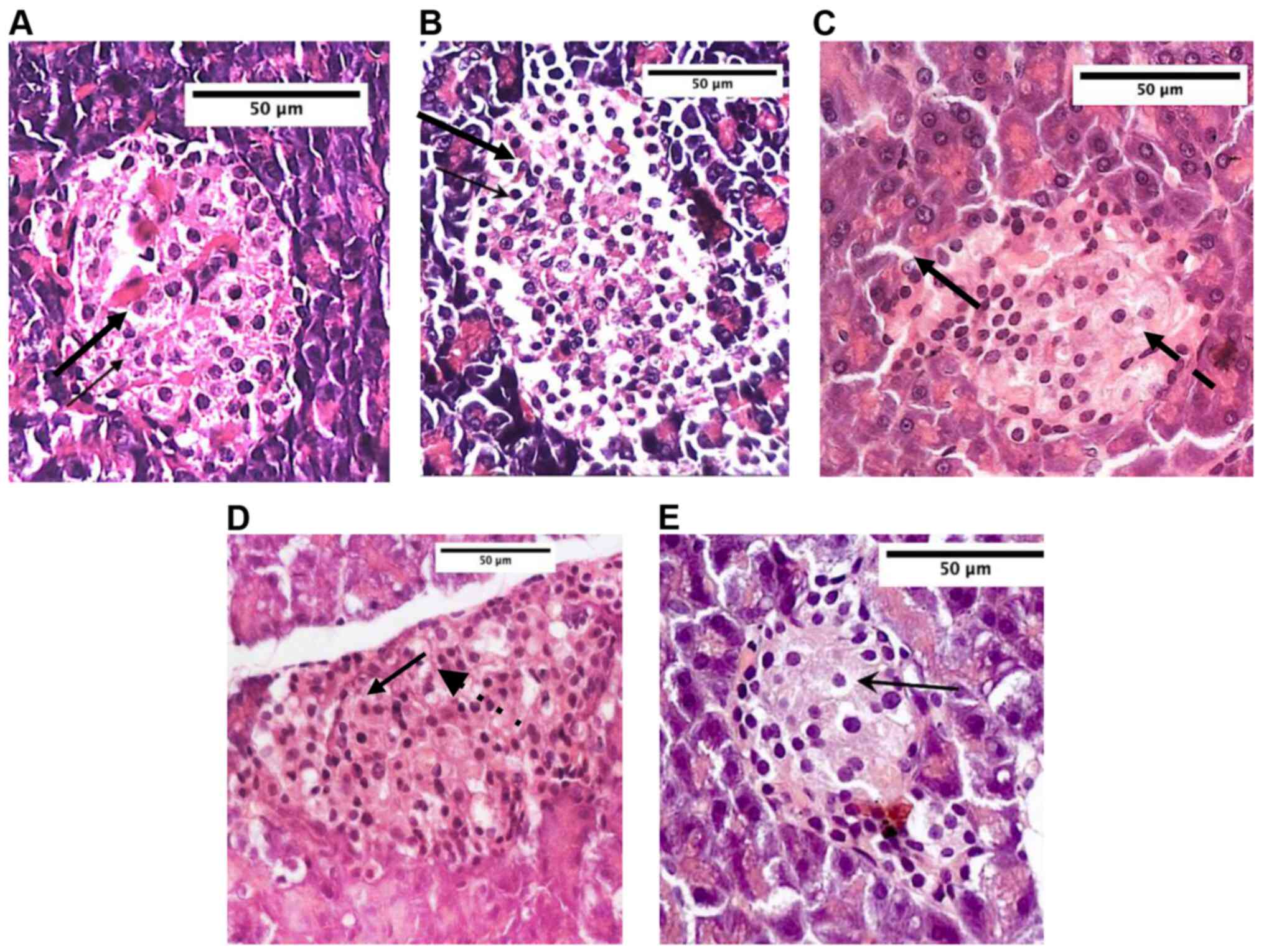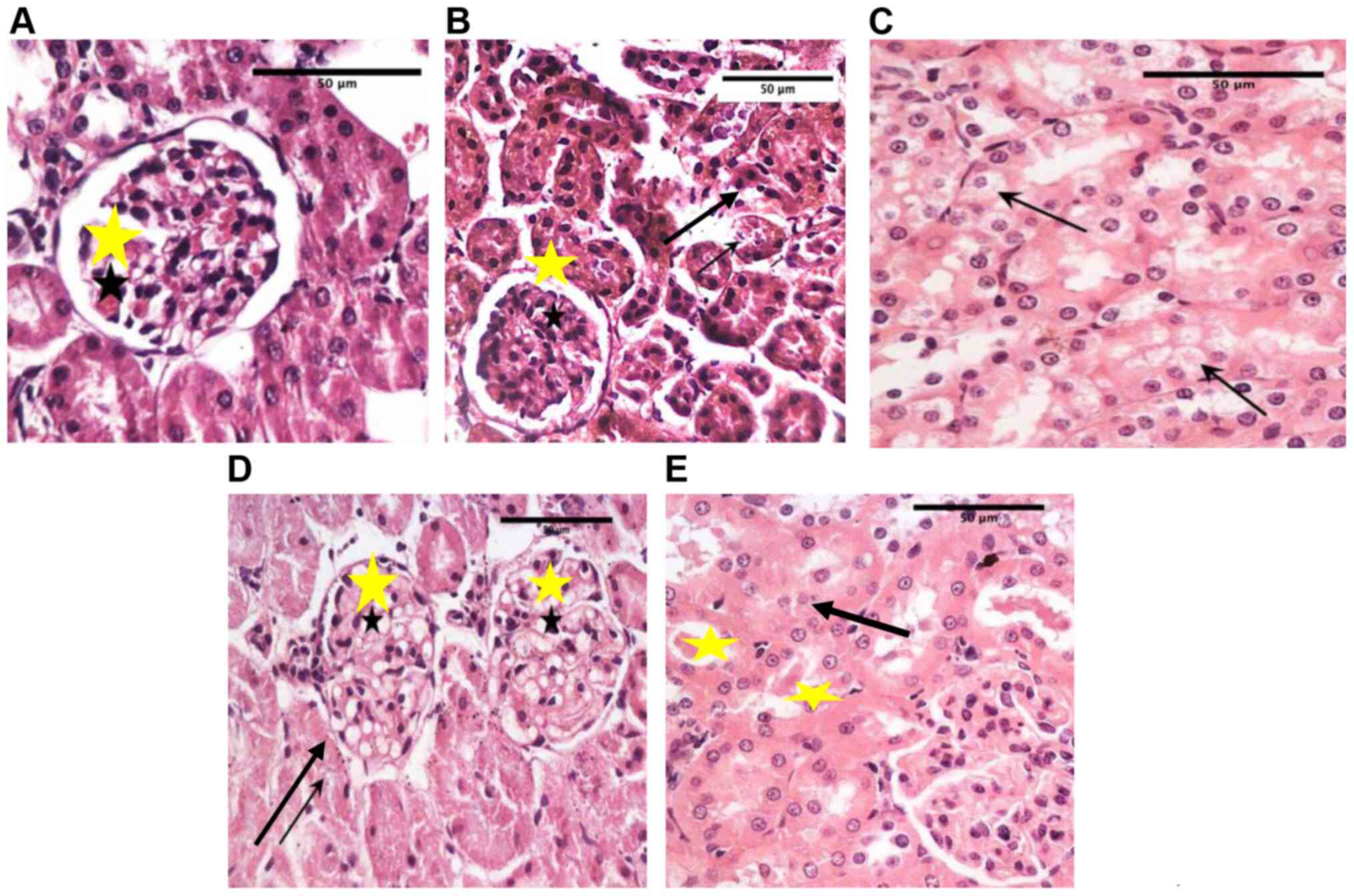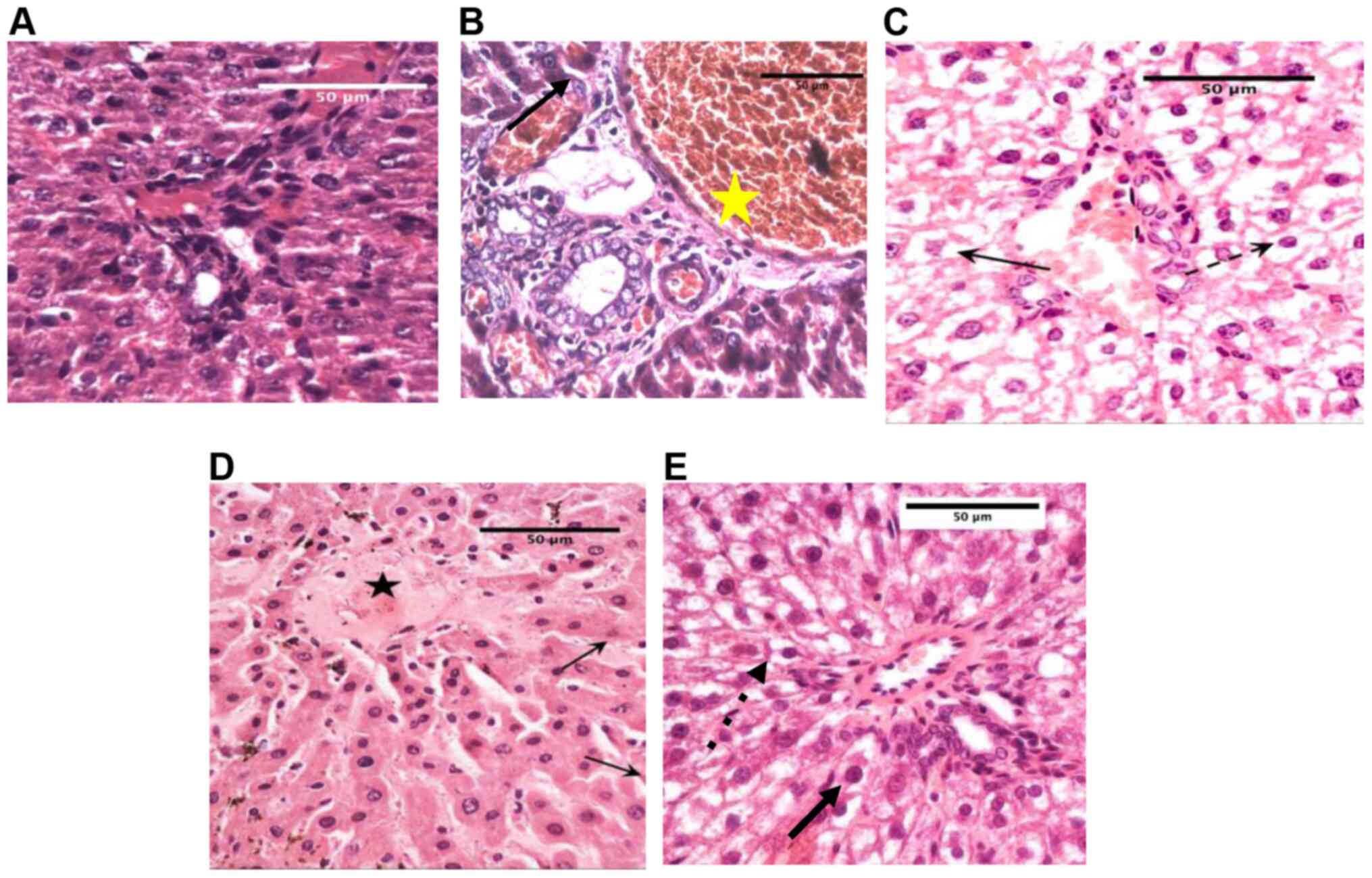|
1
|
Ota A and Ulrih NP: An overview of herbal
products and secondary metabolites used for management of type two
diabetes. Front Pharmacol. 8(436)2017.PubMed/NCBI View Article : Google Scholar
|
|
2
|
Choudhury H, Pandey M, Hua CK, Mun CS,
Jing JK, Kong L, Ern LY, Ashraf NA, Kit SW, Yee TS, et al: An
update on natural compounds in the remedy of diabetes mellitus: A
systematic review. J Tradit Complement Med. 8:361–376.
2017.PubMed/NCBI View Article : Google Scholar
|
|
3
|
Essa R, El Sadek AM, Baset ME, Rawash MA,
Sami DG, Badawy MT, Mansour ME, Attia H, Saadeldin MK and
Abdellatif A: Effects of turmeric (Curcuma longa) extract in
streptozocin-induced diabetic model. J Food Biochem.
43(e12988)2019.PubMed/NCBI View Article : Google Scholar
|
|
4
|
Bi X, Lim J and Henry CJ: Spices in the
management of diabetes mellitus. Food Chem. 217:281–293.
2017.PubMed/NCBI View Article : Google Scholar
|
|
5
|
Governa P, Baini G, Borgonetti V, Cettolin
G, Giachetti D, Magnano AR, Miraldi E and Biagi M: Phytotherapy in
the management of diabetes: A Review. Molecules.
23(E105)2018.PubMed/NCBI View Article : Google Scholar
|
|
6
|
Adam SH, Giribabu N, Kassim N, Kumar KE,
Brahmayya M, Arya A and Salleh N: Protective effect of aqueous seed
extract of Vitis Vinifera against oxidative stress, inflammation
and apoptosis in the pancreas of adult male rats with diabetes
mellitus. Biomed Pharmacother. 81:439–452. 2016.PubMed/NCBI View Article : Google Scholar
|
|
7
|
Deng R: A review of the hypoglycemic
effects of five commonly used herbal food supplements. Recent Pat
Food Nutr Agric. 4:50–60. 2012.PubMed/NCBI View Article : Google Scholar
|
|
8
|
Medagama AB and Bandara R: The use of
complementary and alternative medicines (CAMs) in the treatment of
diabetes mellitus: Is continued use safe and effective? Nutr J.
13(102)2014.PubMed/NCBI View Article : Google Scholar
|
|
9
|
Basch E, Ulbricht C, Kuo G, Szapary P and
Smith M: Therapeutic applications of fenugreek. Altern Med Rev.
8:20–27. 2003.PubMed/NCBI
|
|
10
|
Nagulapalli Venkata KC, Swaroop A, Bagchi
D and Bishayee A: A small plant with big benefits: Fenugreek
(Trigonella foenum-graecum Linn.) for disease prevention and
health promotion. Mol Nutr Food Res. 61(1600950)2017.PubMed/NCBI View Article : Google Scholar
|
|
11
|
Naicker N, Nagiah S, Phulukdaree A and
Chuturgoon A: Trigonella foenum-graecum seed extract,
4-hydroxyisoleucine, and metformin stimulate proximal insulin
signaling and increase expression of glycogenic enzymes and GLUT2
in HepG2 cells. Metab Syndr Relat Disord. 14:114–120.
2016.PubMed/NCBI View Article : Google Scholar
|
|
12
|
Kumar A, Aswal S, Chauhan A, Semwal RB,
Kumar A and Semwal DK: Ethnomedicinal investigation of medicinal
plants of Chakrata region (Uttarakhand) used in the traditional
medicine for diabetes by Jaunsari tribe. Nat Prod Bioprospect.
9:175–200. 2019.PubMed/NCBI View Article : Google Scholar
|
|
13
|
Pradeep SR and Srinivasan K: Amelioration
of hyperglycemia and associated metabolic abnormalities by a
combination of fenugreek (Trigonella foenum-graecum) seeds
and onion (Allium cepa) in experimental diabetes. J Basic Clin
Physiol Pharmacol. 28:493–505. 2017.PubMed/NCBI View Article : Google Scholar
|
|
14
|
Verma N, Usman K, Patel N, Jain A, Dhakre
S, Swaroop A, Bagchi M, Kumar P, Preuss HG and Bagchi D: A
multicenter clinical study to determine the efficacy of a novel
fenugreek seed (Trigonella foenum-graecum) extract
(Fenfuro™) in patients with type 2 diabetes. Food Nutr Res.
60(32382)2016.PubMed/NCBI View Article : Google Scholar
|
|
15
|
Tomcik KA, Smiles WJ, Camera DM, Hügel HM,
Hawley JA and Watts R: Fenugreek increases insulin-stimulated
creatine content in L6C11 muscle myotubes. Eur J Nutr. 56:973–979.
2017.PubMed/NCBI View Article : Google Scholar
|
|
16
|
Maritim AC, Sanders RA and Watkins JB III:
Effects of alpha-lipoic acid on biomarkers of oxidative stress in
streptozotocin-induced diabetic rats. J Nutr Biochem. 14:288–294.
2003.PubMed/NCBI View Article : Google Scholar
|
|
17
|
Aebi H: Catalase in vitro. Methods
Enzymol. 105:121–126. 1984.PubMed/NCBI View Article : Google Scholar
|
|
18
|
Paglia DE and Valentine WN: Studies on the
quantitative and qualitative characterization of erythrocyte
glutathione peroxidase. J Lab Clin Med. 70:158–169. 1967.PubMed/NCBI
|
|
19
|
Habig WH, Pabst MJ, Fleischner G,
Gatmaitan Z, Arias IM and Jakoby WB: The identity of glutathione
S-transferase B with ligandin, a major binding protein of liver.
Proc Natl Acad Sci USA. 71:3879–3882. 1974.PubMed/NCBI View Article : Google Scholar
|
|
20
|
Vetter HF and Vullers R: Effectiveness of
enzyme substitution with pancynorm in chronic gastroduodenitis.
Munch Med Wochenschr. 100:1786–1787. 1958.(In German). PubMed/NCBI
|
|
21
|
Szkudelski T: The mechanism of alloxan and
streptozotocin action in B cells of the rat pancreas. Physiol Res.
50:537–546. 2001.PubMed/NCBI
|
|
22
|
Lenzen S: The mechanisms of alloxan- and
streptozotocin-induced diabetes. Diabetologia. 51:216–226.
2008.PubMed/NCBI View Article : Google Scholar
|
|
23
|
Ozkol H, Tuluce Y, Dilsiz N and Koyuncu I:
Therapeutic potential of some plant extracts used in Turkish
traditional medicine on streptozocin-induced type 1 diabetes
mellitus in rats. J Membr Biol. 246:47–55. 2013.PubMed/NCBI View Article : Google Scholar
|
|
24
|
Little RR and Roberts WL: A review of
variant hemoglobins interfering with hemoglobin A1c measurement. J
Diabetes Sci Technol. 3:446–451. 2009.PubMed/NCBI View Article : Google Scholar
|
|
25
|
Little RR and Sacks DB: HbA1c: How do we
measure it and what does it mean? Curr Opin Endocrinol Diabetes
Obes. 16:113–118. 2009.PubMed/NCBI View Article : Google Scholar
|
|
26
|
Pundir CS and Chawla S: Determination of
glycated hemoglobin with special emphasis on biosensing methods.
Anal Biochem. 444:47–56. 2014.PubMed/NCBI View Article : Google Scholar
|
|
27
|
Haeri MR, Limaki HK, White CJ and White
KN: Non-insulin dependent anti-diabetic activity of (2S, 3R, 4S)
4-hydroxyisoleucine of fenugreek (Trigonella foenum graecum) in
streptozotocin-induced type I diabetic rats. Phytomedicine.
19:571–574. 2012.PubMed/NCBI View Article : Google Scholar
|
|
28
|
Puri D, Prabhu KM and Murthy PS: Mechanism
of action of a hypoglycemic principle isolated from fenugreek
seeds. Indian J Physiol Pharmacol. 46:457–462. 2002.PubMed/NCBI
|
|
29
|
Murao K, Yu X, Imachi H, Cao WM, Chen K,
Matsumoto K, Nishiuchi T, Wong NC and Ishida T: Hyperglycemia
suppresses hepatic scavenger receptor class B type I expression. Am
J Physiol Endocrinol Metab. 294:E78–E87. 2008.PubMed/NCBI View Article : Google Scholar
|
|
30
|
Noor Mohamad Zin NS, Hashim N, Samsulrizal
N and Azmi NS: The protective effect of Azadirachta excelsa
leaves extract and quercetin treatment on the learning and memory
impairments in relation with insulin and amylin levels in the brain
of streptozotocin-induced diabetic rats. J King Saud Univ Sci.
31:299–307. 2019.https://doi.org/10.1016/j.jksus.2018.05.017.
|
|
31
|
Kalailingam P, Kannaian B, Tamilmani E and
Kaliaperumal R: Efficacy of natural diosgenin on cardiovascular
risk, insulin secretion, and beta cells in streptozotocin
(STZ)-induced diabetic rats. Phytomedicine. 21:1154–1161.
2014.PubMed/NCBI View Article : Google Scholar
|
|
32
|
Hamden K, Jaouadi B, Carreau S, Aouidet A,
El-Fazaa S, Gharbi N and Elfeki A: Potential protective effect on
key steroidogenesis and metabolic enzymes and sperm abnormalities
by fenugreek steroids in testis and epididymis of surviving
diabetic rats. Arch Physiol Biochem. 116:146–155. 2010.PubMed/NCBI View Article : Google Scholar
|
|
33
|
Jin Y, Shi Y, Zou Y, Miao C, Sun B and Li
C: Fenugreek prevents the development of STZ-induced diabetic
nephropathy in a rat model of diabetes. Evid Based Complement
Alternat Med. 2014(259368)2014.PubMed/NCBI View Article : Google Scholar
|
|
34
|
Xue WL, Li XS, Zhang J, Liu YH, Wang ZL
and Zhang RJ: Effect of Trigonella foenum-graecum
(fenugreek) extract on blood glucose, blood lipid and
hemorheological properties in streptozotocin-induced diabetic rats.
Asia Pac J Clin Nutr. 16 (Suppl 1):422–426. 2007.PubMed/NCBI
|
|
35
|
Xue W, Lei J, Li X and Zhang R: Trigonella
foenum graecum seed extract protects kidney function and morphology
in diabetic rats via its antioxidant activity. Nutr Res.
31:555–562. 2011.PubMed/NCBI View Article : Google Scholar
|
|
36
|
Jiang W, Gao L, Li P, Kan H, Qu J, Men L
and Liu Z and Liu Z: Metabonomics study of the therapeutic
mechanism of fenugreek galactomannan on diabetic hyperglycemia in
rats, by ultra-performance liquid chromatography coupled with
quadrupole time-of-flight mass spectrometry. J Chromatogr B Analyt
Technol Biomed Life Sci. 1044-1045:8–16. 2017.PubMed/NCBI View Article : Google Scholar
|
|
37
|
Jiang W, Si L, Li P, Bai B, Qu J, Hou B,
Zou H, Fan X, Liu Z, Liu Z, et al: Serum metabonomics study on
antidiabetic effects of fenugreek flavonoids in
streptozotocin-induced rats. J Chromatogr B Analyt Technol Biomed
Life Sci. 1092:466–472. 2018.PubMed/NCBI View Article : Google Scholar
|
|
38
|
Brent JA and Rumack BH: Role of free
radicals in toxic hepatic injury. II. Are free radicals the cause
of toxin-induced liver injury? J Toxicol Clin Toxicol. 31:173–196.
1993.PubMed/NCBI View Article : Google Scholar
|
|
39
|
Elmnan A, Balgees A and Mangara JL: Effect
of fenugreek (Trigonella foenm greacum) seed dietary levels
on lipid profile and body weight gain of rats. Pak J Nutr.
11:1004–1008. 2012.
|
|
40
|
Garcia TS, Rech TH and Leitão CB:
Pancreatic volume in diabetes mellitus. Pancreas.
46(e51)2017.PubMed/NCBI View Article : Google Scholar
|
|
41
|
Garcia TS, Rech TH and Leitão CB:
Pancreatic size and fat content in diabetes: A systematic review
and meta-analysis of imaging studies. PLoS One.
12(e0180911)2017.PubMed/NCBI View Article : Google Scholar
|
|
42
|
Raju J and Bird RP: Alleviation of hepatic
steatosis accompanied by modulation of plasma and liver TNF-alpha
levels by Trigonella foenum graecum (fenugreek) seeds in Zucker
obese (fa/fa) rats. Int J Obes. 30:1298–1307. 2006.PubMed/NCBI View Article : Google Scholar
|
|
43
|
Sushma N and Devasena T: Aqueous extract
of Trigonella foenum graecum (fenugreek) prevents
cypermethrin-induced hepatotoxicity and nephrotoxicity. Hum Exp
Toxicol. 29:311–319. 2010.PubMed/NCBI View Article : Google Scholar
|
|
44
|
Sharma MS and Choudhary PR: Hypolipidemic
effect of fenugreek seeds and its comparison with atorvastatin on
experimentally induced hyperlipidemia. J Coll Physicians Surg Pak.
24:539–542. 2014.PubMed/NCBI
|
|
45
|
Marzouk M, Soliman AM and Omar TY:
Hypoglycemic and antioxidative effects of fenugreek and termis
seeds powder in streptozotocin-diabetic rats. Eur Rev Med Pharmacol
Sci. 17:559–565. 2013.PubMed/NCBI
|
|
46
|
Shivakumar A, Jashmitha BG and Dhruvaraj
MR: Role of peroxidase in clinical assays: A short review. J Clin
Nutr Diet. 3(2)2017.https://doi.org/10.4172/2472-1921.100048.
|
|
47
|
Gaddam A, Galla C, Thummisetti S,
Marikanty RK, Palanisamy UD and Rao PV: Role of fenugreek in the
prevention of type 2 diabetes mellitus in prediabetes. J Diabetes
Metab Disord. 14(74)2015.PubMed/NCBI View Article : Google Scholar
|
|
48
|
Herrera T, Navarro Del Hierro J, Fornari
T, Reglero G and Martin D: Acid hydrolysis of saponin-rich extracts
of quinoa, lentil, fenugreek and soybean to yield sapogenin-rich
extracts and other bioactive compounds. J Sci Food Agric.
99:3157–3167. 2019.PubMed/NCBI View Article : Google Scholar
|
|
49
|
Srinivasan K: Plant foods in the
management of diabetes mellitus: Spices as beneficial antidiabetic
food adjuncts. Int J Food Sci Nutr. 56:399–414. 2005.PubMed/NCBI View Article : Google Scholar
|















